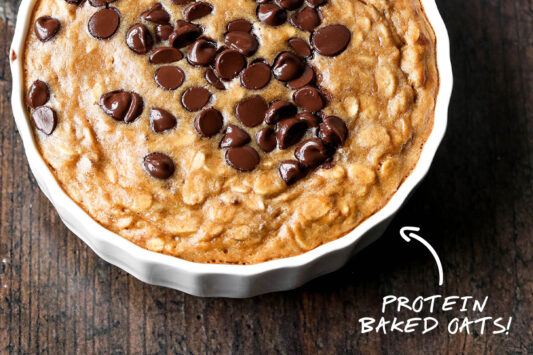Unless you’ve been living under a rock for the past decade, you know how popular whey protein is. It’s everywhere. There are protein bars, nut butters, chocolate and even Protein Spray Tan (though I hope this is joke product!).
Whey protein is a liquid by-product created during cheese production which is dried, processed and partially purified for use in commercial protein powders. Whey protein isn’t just one specific protein; it’s actually a combination of numerous different proteins including lactalbumin, lactoferrin, immunoglobulins (the immune system’s best friend!) as well as carbohydrates (lactose) and fats.
Bodybuilders and powerlifters alike preach the power of whey protein with most people supplementing with the wonderful whey in some form. Considering its popularity and irrefutable advantages, many don’t know what it actually is and why it will benefit them, bar its macro-friendly profile.
Why We Love It!
It’s quite a challenge to sum up the advantages of whey protein in one single paragraph due to its array of biological benefits but we’ll take a look at the most important.
1. Immunity
Whey protein is highly concentrated in the amino acid L-cysteine and other bioactive compounds such as lactoferrin and immunoglobulins. Cysteine is an essential amino acid heavily involved in the biosynthesis of glutathione, the body’s most important antioxidant. Lactalbumin (which constitutes up to 65% of whey protein) augments the body’s production of neutrophils and other white blood cells (the little ninjas of your immune system!) which are considered the body’s first line of defence against invading bacteria and viruses.
2. Glutamine and BCAAs
Branched chain amino acids (BCAA) are special amino acids with the ability to bypass the liver and travel straight to skeletal muscle in order to be used by the body. This is particularly advantageous during periods of exercise where eating a large meal is far from desirable (ever try to squat on a full stomach?) or when protein is out of reach. Glutamine, an amino acid which is abundant in whey protein, not only assists in recovery and protein synthesis but also enhances nutrient uptake in the gut by repairing and maintaining intestinal integrity. Weight training is stressful on the body and on its resources so we need to keep that stomach strong too!
3. Convenience and biological availability
Let’s face it. We’re all busy (and if you’re like me, broke!) and sometimes we just don’t have the time or money to prepare a luxurious feast of protein rich meals. Supplementing with whey protein provides our diet with an excellent source of highly bioavailable protein (absorbed easily by the body) in a cost effective manner. A 30g serving of BULK POWDERS™ Pure Whey Protein™ costs as little as £0.80 while packing a protein punch of 27g. Plus, who doesn’t want a Birthday Cake flavoured shake? It’s better than any chicken breast I’ve ever eaten!
So Much Choice! Which Do I Take?
Whey protein has definitely earned its place in your everyday supplement stack, but which type of whey protein should you pick? There are so many types of whey protein powders available that it can get a bit confusing, especially to those new to the supplement scene. Each form will suit a particular individual depending on digestive and dietary issues. I’ve laid them out here…
Whey Protein Concentrate (WPC)
The most popular form of whey is definitely WPC and for good reason. Containing up to 90% protein and numerous bioactive compounds (such as those mentioned above) it offers the biggest bang for your buck. However, it also contains small quantities of carbohydrates (such as lactose) and fats and therefore it is unsuitable for those suffering with lactose intolerance.
Whey Protein Isolate (WPI)
This is like the “upgraded” form of WPC. WPI is further purified to remove most of the carbohydrates and fats which simultaneously enriches the percentage of protein per serving. Lactose is removed during the purification process making WPI the perfect protein for those with digestive issues. However, the purification process also removes many of the bioactive compounds that gives whey protein its reputation for its health-boosting effects.
Hydrolysed Whey Protein (HWP)
HWP is “pre-digested” whey protein; meaning the proteins are partially broken down into smaller, more easily digested peptides. The purpose of this is to allow for faster absorption of amino acids into the bloodstream and also enables the protein to be digested easily as the hard work has pretty much been done already.
Take Home Message
I think it’s clear that I’m personally a huge advocate of supplementation with whey protein. However, I am also aware of the issues some individuals have with the delicious macro. These include digestive issues which are usually caused by the bulking agents added during the production process, lactose intolerance and poor breakdown of the protein. These can be avoided by consuming a whey protein tailored to your specific needs. If lactose wreaks havoc on your stomach, consider a whey protein isolate or hydrolysate. If you have a lazy digestive system, look for a whey protein with added digestive enzymes, such as INFORMED WHEY®, which help in the breakdown of the protein.
Of course, nothing beats quality so be sure to purchase your whey protein from a transparent, reputable source such as BULK POWDERS™. If the ingredients list resembles something of a World War II novel, stay far away.
About the Author
Michelle is a scientist, an athlete and a writer and she’s proud to have faced her demons head on and she’s beating them. In weight lifting she found an outlet to help change her life – and she’s loving it! Follow her journey with BULK POWDERS™.
















